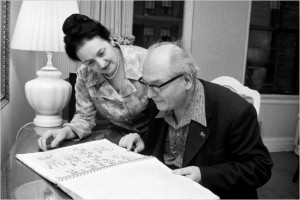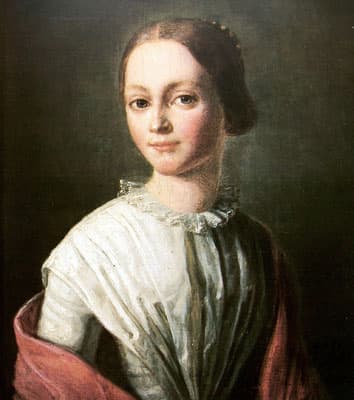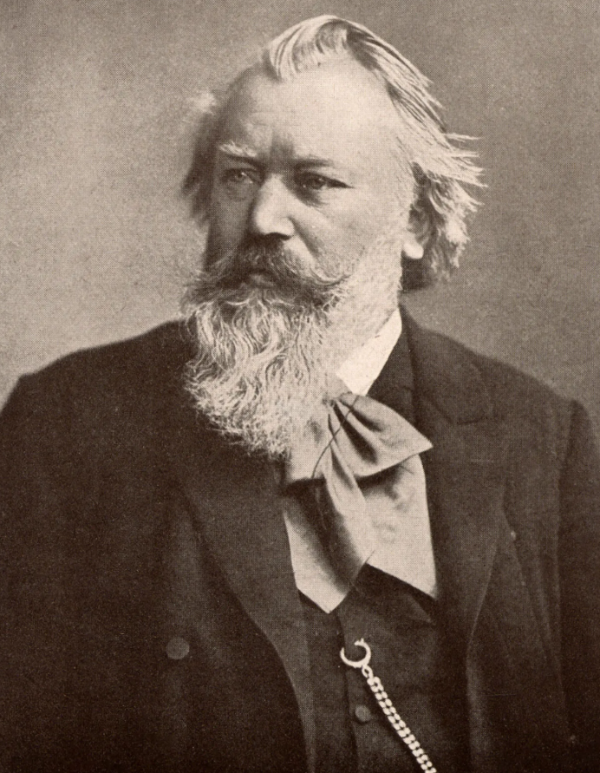
Messiaen with his second wife Yvonne Loriod
Like Debussy, Messiaen gave each Prelude a title, suggesting a narrative for the work. Some are obvious, such as ‘La Colombe’ (‘The Dove’), a piece with delicate flutterings and gentle cooings high in the register, or ‘Un reflet dans le vent…’ (‘A Reflection in the Wind…’), with its stormy gusts and eddies, while others have more esoteric titles: ‘Les sons impalpables de rêve…’ (‘The Intangible Sounds of the Dream’) and ‘Cloches d’angoisse et larmes d’adieu’ (‘Bells of Anguish and Tears of Farewell’). Messiaen’s Preludes are also mystical rather than purely impressionistic, and look forward to his great and profoundly spiritual piano works, Visions de l’Amen (for 2 pianos) and Vingt regards sur l’enfant Jesus.
The influence of Debussy is evident in the use of unresolved or ambiguous veiled harmonies and parallel chords which are used for pianistic colour and timbre rather than definite harmonic progression, but Messiaen’s unique compositional language is already clear in these early piano works in his use of what he called his “modes of limited transposition” – artificial scales that began with the whole-tone scale so beloved of Debussy and evolved into six other symmetrical divisions of the octave. These provide not only melodic direction, but also harmonic colour, and each piece involves detailed associations between sound and colour, which were very important to Messiaen who had synaesthesia: according to the composer, the fifth Prelude, for example, is “polymodal, superimposing an orange-blue ostinato on chordal cascades in a violet-purple mode that is invested with the timbre of a brass instrument.”
Messiaen described his Preludes as “a collection of successive states of mind and personal feelings”. Sadness, loss, and meditations on mortality are found in many of the Preludes, but there is light (physical and metaphorical) as well, as there always is in Messiaen’s music, and they contain many of the features which are so distinctive of Messiaen’s later works: a masking of literal definitions, shimmering sounds, colours, light, “flashes”, and already suggest the vastness of Messiaen’s spiritual and musical landscape, a landscape which makes the Vingt regards such extraordinary pieces to play and to hear. As Alex Ross says of Messiaen’s music in his book The Rest is Noise, it is “an evocation of the vastness of the cosmos that many experience when visiting mountains.” One has the sense, always, when playing or listening to Messiaen of something that is far, far greater than us.
Messiaen shared Debussy’s fascination with the percussive, tinkling, luminous sounds of the gamelan orchestra of Indonesia, and the piano and pianissimo measures in Messiaen’s music can be very effective if played with a slight stridency and brightness of tone (this is a very ‘French’ style of piano playing, and if you listen to Yvonne Loriod, Messiaen’s second wife, playing his music, you can hear that sparkling clarity). And Messiaen, like Debussy before him, capitalised on the piano’s sonorous potential, for example, in the inclusion of deliberately “wrong” notes (to be played more softly that the rest of the material), which create the illusion of the natural sympathetic harmonics set up by the release of the sustaining pedal.
The Preludes are not easy works to play, though ‘La Colombe’ and ‘Plainte Calme’ are within reach of the competent Grade 8 pianist. In addition to large chord clusters, there are many virtuosic elements in the Preludes, including arpeggios, repeated trills, independence of hands and fingers, double notes and octaves, fast tempos and chromatic patterns. These elements reflect Messiaen’s own fluency at the instrument and also his appreciation of how such pianistic tools could be used to create wonderful musical and expressive effects.
MESSIAEN, O.: 8 Preludes




